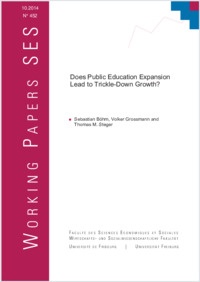Does Public Education Expansion Lead to Trickle-Down Growth?
BP2-STS
-
05.10.2014
62
Directed Technological Change
Publicly Financed Education
Redistributive Transfers
Transitional Dynamics
Trickle-Down Growth
English
The paper revisits the debate on trickle-down growth in view of the widely discussed evolution of the earnings and income distribution that followed a massive expansion of higher education. We propose a dynamic general equilibrium model to dynamically evaluate whether economic growth triggered by an increase in public education expenditure on behalf of those with high learning ability eventually trickles down to low-ability workers and serves them better than redistributive transfers. Our results suggest that, in the shorter run, low-skilled workers lose. They are better off from promoting equally sized redistributive transfers. In the longer run, however, low-skilled workers eventually benefit more from the education policy. Interestingly, although the expansion of education leads to sustained increases in the skill premium, income inequality follows an inverted U-shaped evolution.
- Collections
- Faculty
- Faculté des sciences économiques et sociales et du management
- Language
-
- English
- Classification
- Economics
- Series statement
-
- Working Papers SES ; 452
- License
-
License undefined
- Identifiers
-
- RERO DOC 232544
- RERO R008037628
- Persistent URL
- https://folia.unifr.ch/unifr/documents/303876
Statistics
Document views: 179
File downloads:
- Document: 224
